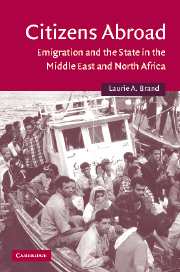Book contents
- Frontmatter
- Contents
- List of tables
- Preface
- List of acronyms
- 1 States and their citizens abroad
- 2 State sovereignty, state resilience
- 3 Morocco: expatriates as subjects or citizens?
- 4 Tunisia's expatriates: an integral part of the national community?
- 5 Lebanon and its expatriates: a bird with two wings
- 6 Jordan: unwilling citizens, problematic expatriates
- Conclusions: transnationalism, security and sovereignty
- Bibliography
- Index
- Cambridge Middle East Studies 23
Preface
Published online by Cambridge University Press: 22 September 2009
- Frontmatter
- Contents
- List of tables
- Preface
- List of acronyms
- 1 States and their citizens abroad
- 2 State sovereignty, state resilience
- 3 Morocco: expatriates as subjects or citizens?
- 4 Tunisia's expatriates: an integral part of the national community?
- 5 Lebanon and its expatriates: a bird with two wings
- 6 Jordan: unwilling citizens, problematic expatriates
- Conclusions: transnationalism, security and sovereignty
- Bibliography
- Index
- Cambridge Middle East Studies 23
Summary
It was during a quiet Saturday afternoon in Los Angeles that a program on Arab-American television triggered my initial interest in the state and emigration. This particular day, the program featured an interview with Talal Arslan, the Lebanese Minister of Expatriates. Listening to the interview, I realized that I had not been aware that a ministry devoted to nationals abroad existed, in Lebanon or elsewhere in the Arab world. In the weeks that followed, I learned that in fact a number of Arab (and other) countries had similar institutions, but that little research had been done on them, and the idea for this research was born.
The subsequent development of the project, however, was far from what I had initially envisaged. First, heavy administrative duties as a center director, then the tremendous demands on my time placed by the aftermath of September 11 meant halting progress at best. By the time a sabbatical finally enabled me to focus fully on the research abroad, war drums had begun beating inside the Beltway. In spring 2003, the period I had set aside for the major drafting of the book, Washington launched its invasion of Iraq and, living in Beirut at the time, my attention turned from book writing to war protesting.
Since the invasion, there have been many times when the intellectual call of this project sadly paled in comparison with the need to devote time to speaking out against the Bush administration's domestic and foreign policy record.
- Type
- Chapter
- Information
- Citizens AbroadEmigration and the State in the Middle East and North Africa, pp. xi - xiiiPublisher: Cambridge University PressPrint publication year: 2006

